Hey beautiful ladies! I’m so excited to share something that has literally been a game-changer in my wellness routine. As someone who’s always struggled with seasonal allergies and those annoying sinus infections, I’ve discovered the amazing world of essential oils for sinus relief.
Trust me, I know how frustrating it can be when you’re dealing with blocked sinuses while trying to look and feel your best. That stuffy nose, the pressure around your eyes, and that overall blah feeling can really put a damper on your style game.
Today, I’m sharing everything I’ve learned about using essential oils for sinus infections naturally. This isn’t just another beauty trend – it’s about taking care of your health from the inside out!
Table of Contents
Understanding Sinus Infection Symptoms
Before we dive into the amazing world of essential oils, let’s talk about what we’re actually dealing with. I remember the first time I had a proper sinus infection – I thought it was just a bad cold that wouldn’t go away.
Sinus infections happen when your nasal passages get inflamed and swollen. The symptoms can really mess with your daily routine and confidence. Here’s what I experienced and what you might be feeling too:
Common sinus infection symptoms include:
- Stuffy or blocked nose that makes breathing difficult
- Thick, colored mucus discharge
- Facial pain and pressure, especially around your eyes and forehead
- Headaches that seem to get worse when you bend over
- Reduced sense of smell and taste
- Bad breath (so embarrassing!)
- Fatigue and that overall run-down feeling
- Sometimes fever and tooth pain
The worst part? These symptoms can last for weeks if left untreated. That’s when I started looking into natural remedies, and essential oils completely changed my approach to sinus health.
Essential Oils for Sinus Infection: Nature’s Pharmacy
Ladies, let me tell you about the magic of essential oils for sinusitis! These concentrated plant extracts have been used for centuries, and modern research is finally catching up with what our grandmothers knew all along.
Some essential oils, including eucalyptus and peppermint oils, may help open the airways and ease sinus congestion, making them perfect natural alternatives to harsh medications.
What makes essential oils so effective for sinus infections? They work in multiple ways:
Anti-inflammatory properties help reduce swelling in your nasal passages. When I first started using lavender oil during my evening skincare routine, I noticed my morning congestion was much better.
Antimicrobial benefits can help fight off the bacteria or viruses causing your infection. Tea tree oil became my go-to for this reason.
Decongestant effects help break up that stubborn mucus and clear your airways. Peppermint oil is absolutely incredible for this!
Pain relief can ease those awful facial pressure headaches that come with sinus issues.
The best part? You can incorporate these oils into your daily self-care routine while treating your sinus problems naturally.
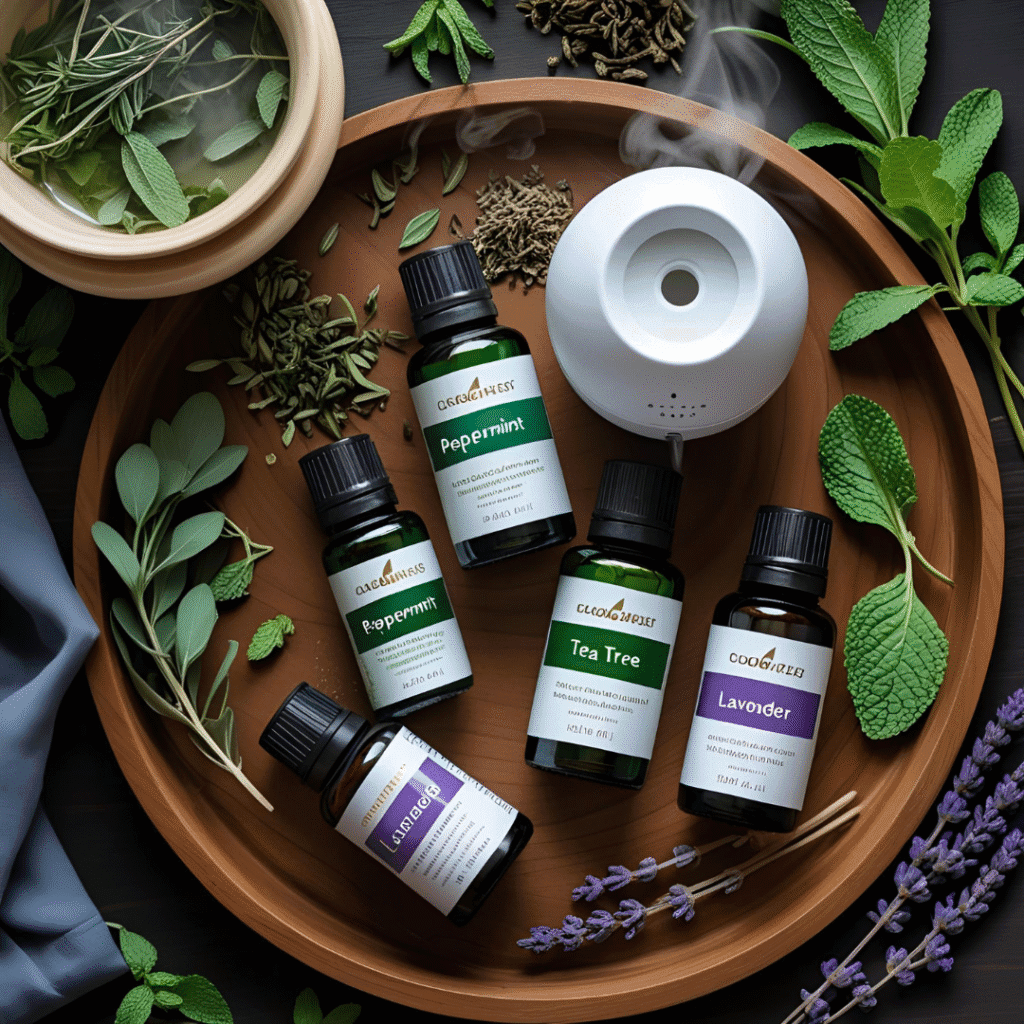
Types of Essential Oils That Can Treat Sinusitis
After trying dozens of different oils, I’ve narrowed down my favorites that actually work. Here are the essential oils that have become staples in my wellness cabinet:
Eucalyptus Oil is hands down my number one choice. Eucalyptus oil has powerful anti-inflammatory and antibacterial properties, making it an excellent choice for those suffering from sinusitis. I add a few drops to my diffuser every morning, and it helps me breathe clearly all day.
Peppermint Oil is like a breath of fresh air (literally!). The menthol content works as a natural decongestant. I love adding it to my steam treatments – it’s so refreshing and clears my sinuses instantly.
Tea Tree Oil has incredible antimicrobial properties. Tea tree oil is known for its antiviral and antimicrobial properties. Those who suffer from sinus congestion due to allergies can benefit from the relief that tea tree oil has to offer. I use it in my homemade facial steam blend.
Lavender Oil is perfect for bedtime routines. Lavender oil is used as a decongestant to unclog the nasal airways and relieve sinus pressure. It helps me sleep better even when I’m congested, and I wake up feeling more refreshed.
Rosemary Oil has anti-inflammatory properties that help reduce sinus pressure. I mix it with a carrier oil for gentle temple massages.
Lemon Oil boosts your immune system and has natural antibacterial properties. I diffuse it during the day to keep my space fresh and support my overall health.
Frankincense Oil is amazing for reducing inflammation and supporting respiratory health. It’s become part of my daily meditation practice.
Oregano Oil is potent and antimicrobial, but use it carefully – it’s very strong! I only use it diluted and sparingly.
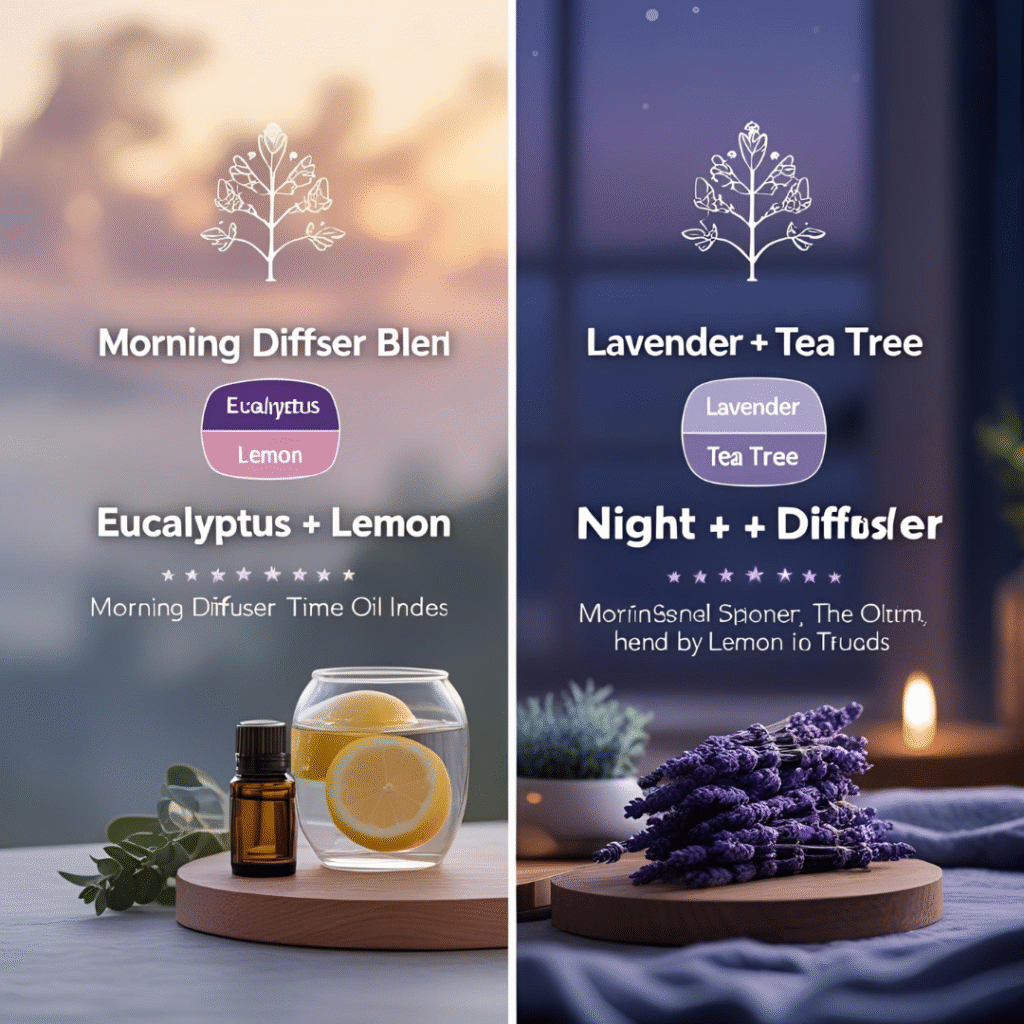
How to Use Essential Oils to Clear Sinuses
Now for the fun part – let me share all the different ways I use essential oils for sinus relief! I’ve tried everything, and these methods actually work.
Steam Inhalation Method
This is my absolute favorite technique, especially during my evening skincare routine. Here’s how I do it:
Fill a large bowl with hot (not boiling) water. Add 3-5 drops of eucalyptus or peppermint oil. Create a tent with a towel over your head and the bowl. Breathe in the steam for 5-10 minutes.
I do this while I’m waiting for my face mask to work – it’s like a spa treatment at home!
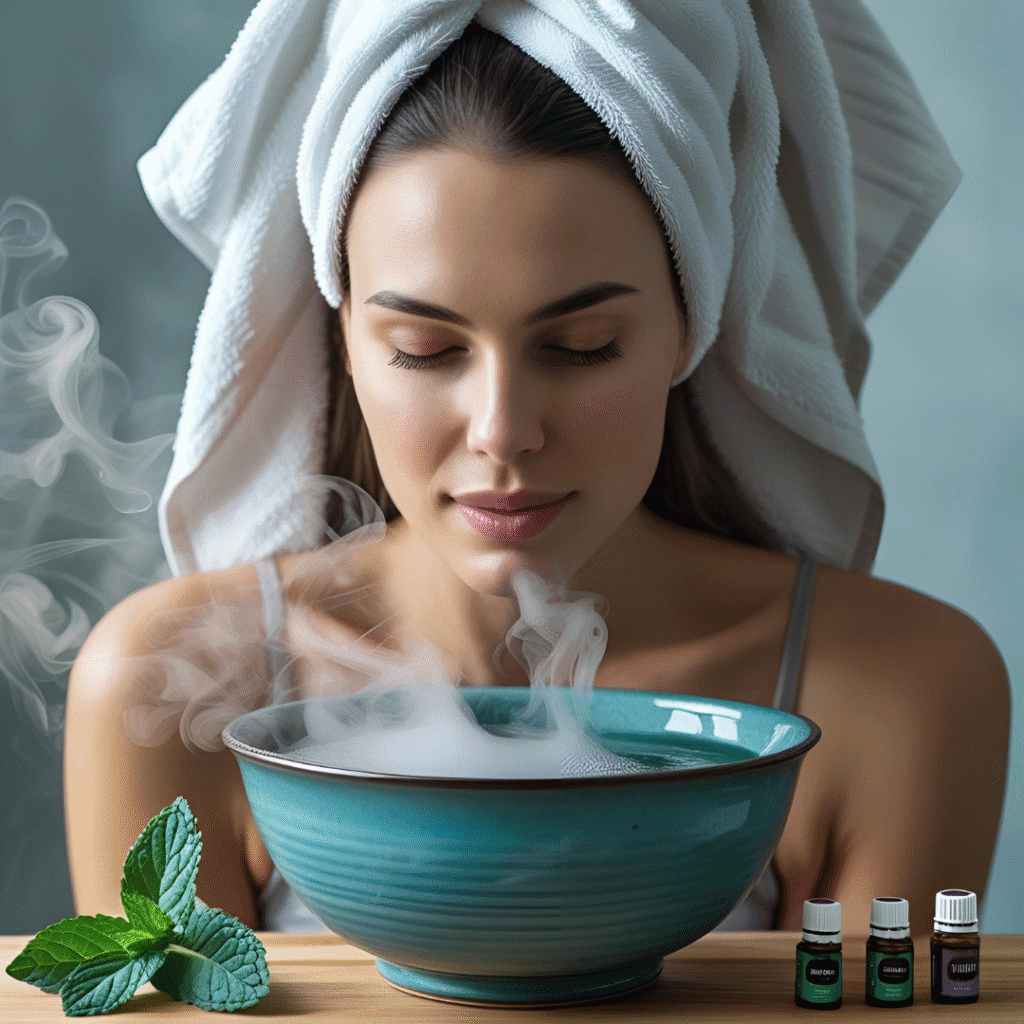
Diffuser Method
I have diffusers in my bedroom and living room, and I use them daily. Add 5-8 drops of your chosen essential oil to your diffuser with water. Run it for 30-60 minutes at a time.
My morning blend: 3 drops eucalyptus + 2 drops lemon My evening blend: 3 drops lavender + 2 drops tea tree
Direct Inhalation
When I need quick relief (like before an important meeting), I put 1-2 drops of peppermint or eucalyptus oil on a tissue and inhale gently. You can also use personal inhalers – they’re so convenient to carry in your purse!
Topical Application
Always dilute essential oils with a carrier oil first! I use coconut oil or jojoba oil. Mix 2-3 drops of essential oil with 1 tablespoon of carrier oil.
I gently massage this blend on my temples, behind my ears, and on my chest. The warming sensation is so soothing, especially with eucalyptus oil.
Bath Soaks
Nothing beats a relaxing bath when you’re feeling under the weather. Add 5-10 drops of lavender or eucalyptus oil mixed with Epsom salts to your bathwater. The steam helps open your sinuses while you relax.
DIY Chest Rub
I make my own chest rub using:
- 2 tablespoons coconut oil
- 5 drops eucalyptus oil
- 3 drops peppermint oil
- 2 drops tea tree oil
Mix everything together and store in a small jar. Apply to your chest and throat before bed.
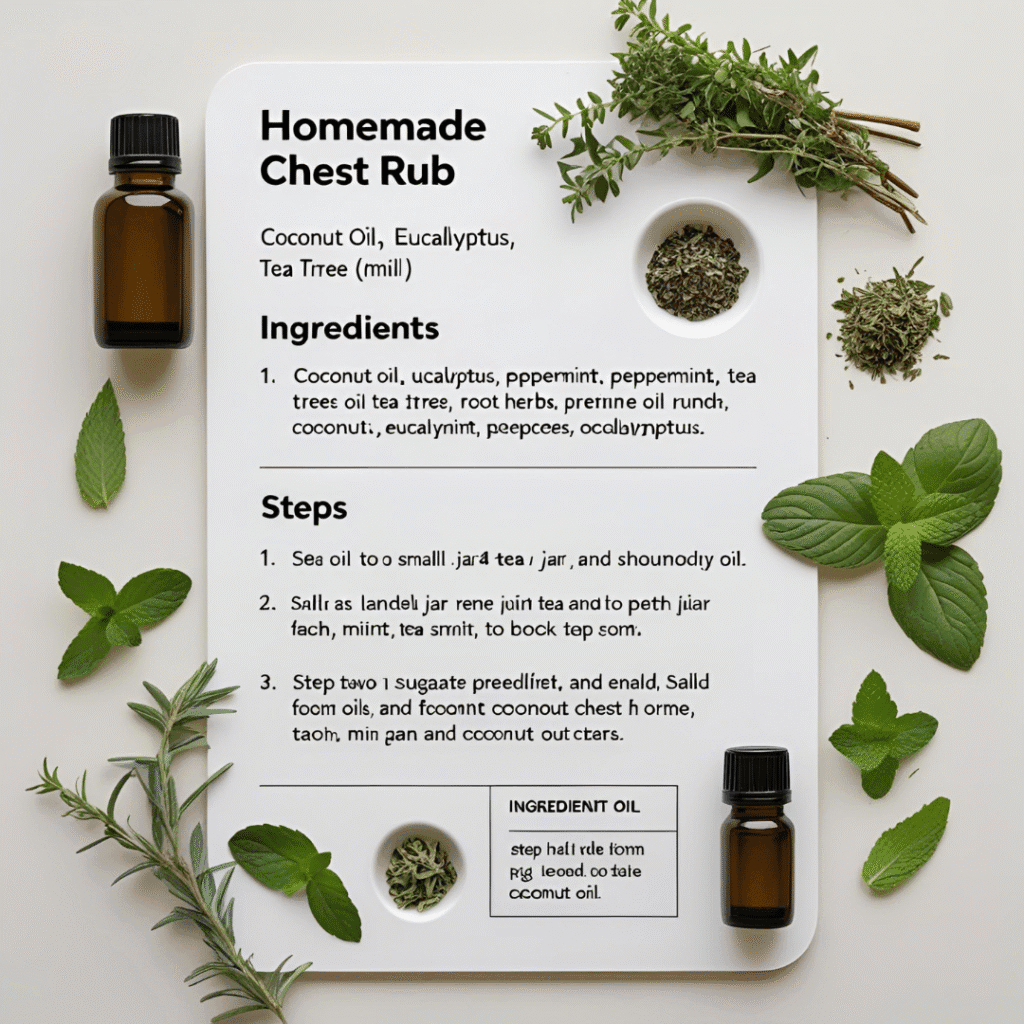
How Effective Are Essential Oils for Treating Sinus Infections?
I know you’re wondering – do essential oils actually work, or is this just another wellness trend? From my personal experience and the research I’ve done, essential oils can be incredibly effective for sinus relief.
Essential oils provide several benefits when it comes to alleviating sinus infections: Anti-inflammatory: Oils like eucalyptus and lavender reduce inflammation in the nasal passages, easing pain and congestion. Decongestant: Menthol-rich oils such as peppermint help to break up mucus.
However, I always want to be honest with you ladies. Essential oils work best for:
- Mild to moderate sinus congestion
- Symptom relief and comfort
- Supporting your body’s natural healing process
- Preventing future infections when used regularly
They might not be enough for severe sinus infections that need medical treatment. I always listen to my body, and if symptoms worsen or last more than 10 days, I see my doctor.
What I love most is that essential oils can be used alongside other treatments. They’ve helped me reduce how often I need over-the-counter medications, and I feel more in control of my health.
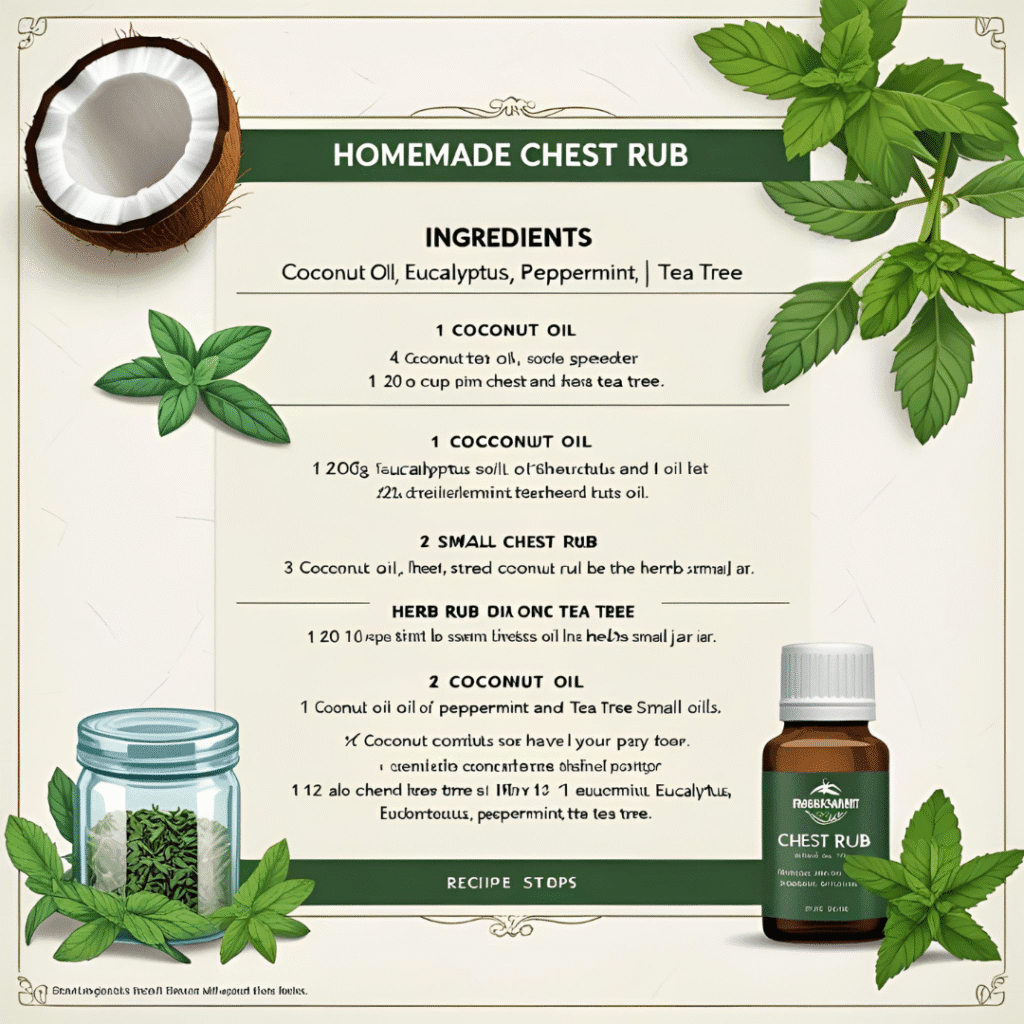
Precautions Before Using Essential Oils for Sinus Infection
Safety first, beautiful! Before you start your essential oil journey, there are some important things to keep in mind. I learned some of these the hard way, so I want to save you from my mistakes.
Always dilute essential oils before applying them to your skin. I once used tea tree oil undiluted and got a nasty skin reaction. Not cute! Use a 2-3% dilution ratio (2-3 drops of essential oil per tablespoon of carrier oil).
Do a patch test first if you have sensitive skin like me. Apply a small amount of diluted oil to your inner wrist and wait 24 hours to check for reactions.
Keep oils away from your eyes – trust me on this one! If you accidentally get oil near your eyes, rinse with milk or carrier oil, not water.
Store oils properly in dark, cool places. Heat and light can break down the beneficial compounds.
Buy quality oils from reputable sources. I’ve learned that cheap oils often contain synthetic fragrances that can actually make sinus problems worse.
Pregnancy and nursing considerations: Some oils aren’t safe during pregnancy. Always check with your healthcare provider first.
Children and pets: Many essential oils aren’t safe for kids under 6 or pets. Keep them stored safely away from little hands and paws.
Don’t ingest oils unless you’re working with a qualified aromatherapist. Some oils that are safe for diffusing or topical use can be toxic if swallowed.
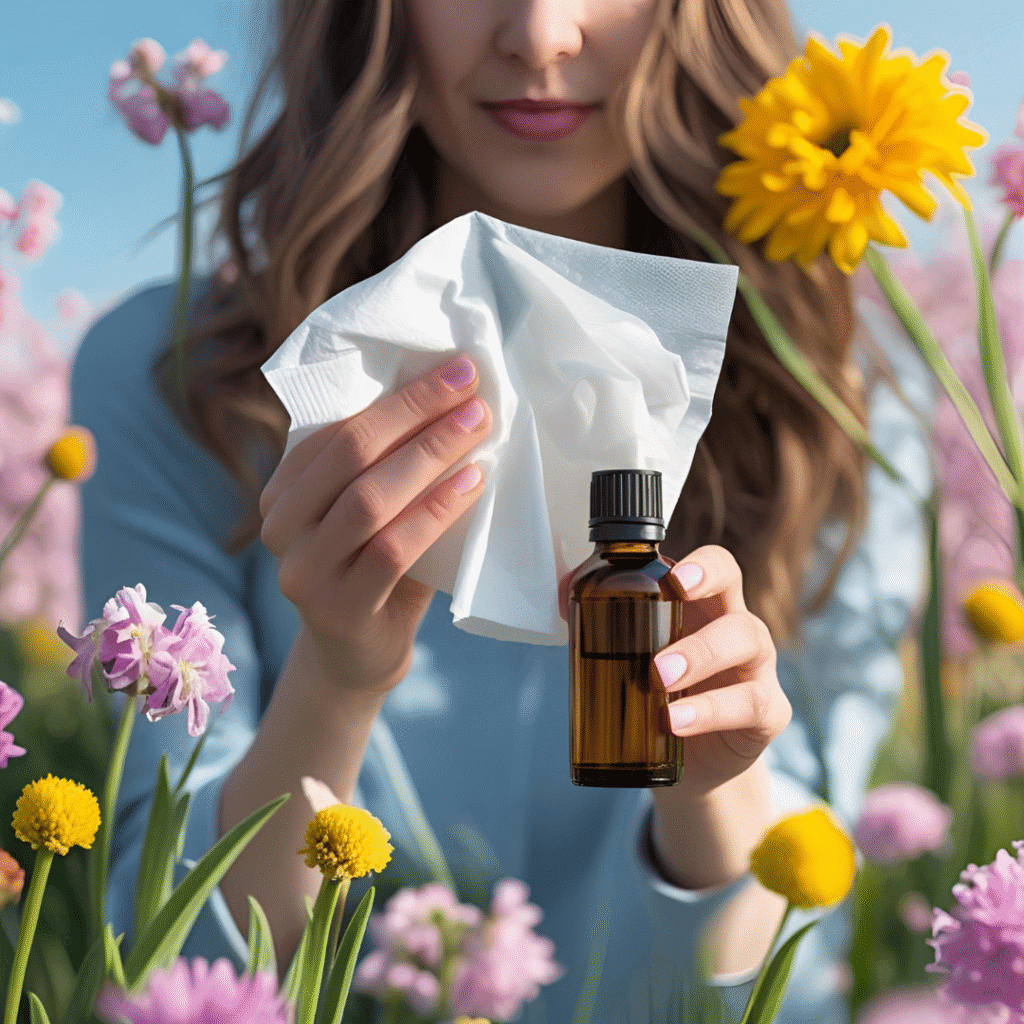
Understanding Flu Symptoms vs Sinus Infections
Sometimes it’s hard to tell if you’re dealing with a sinus infection or the flu. I’ve confused the two before, and it’s important to know the difference so you can treat yourself properly.
Flu symptoms typically include:
- Sudden onset of symptoms
- High fever (usually over 101°F)
- Body aches and chills
- Extreme fatigue
- Dry cough
- Sore throat
- Sometimes stuffy nose
Sinus infection symptoms are more focused on your face and nose:
- Gradual onset
- Facial pain and pressure
- Thick, colored nasal discharge
- Reduced sense of smell
- Usually no fever, or low-grade fever
- Symptoms last longer (7-10 days or more)
The good news? Essential oils can help with both conditions! They support your immune system and provide natural symptom relief.
Essential Oils for Flu Relief
When flu season hits, I boost my essential oil routine to support my immune system and feel better faster. Here are my go-to oils for flu symptoms:
Lemon oil is packed with vitamin C and has natural antibacterial properties. I diffuse it throughout my home during flu season to keep the air fresh and clean.
Oregano oil is incredibly antimicrobial, but it’s potent! I use just one drop mixed with carrier oil on the soles of my feet before bed.
Frankincense oil supports immune function and helps with respiratory issues. I add it to my chest rub blend during flu season.
Peppermint oil helps with nausea and digestive upset that sometimes comes with the flu. A drop on a tissue for gentle inhalation works wonders.
Eucalyptus oil helps with congestion and respiratory support. I use it in steam treatments when I’m feeling run down.
My flu-fighting diffuser blend:
- 3 drops lemon oil
- 2 drops eucalyptus oil
- 1 drop tea tree oil
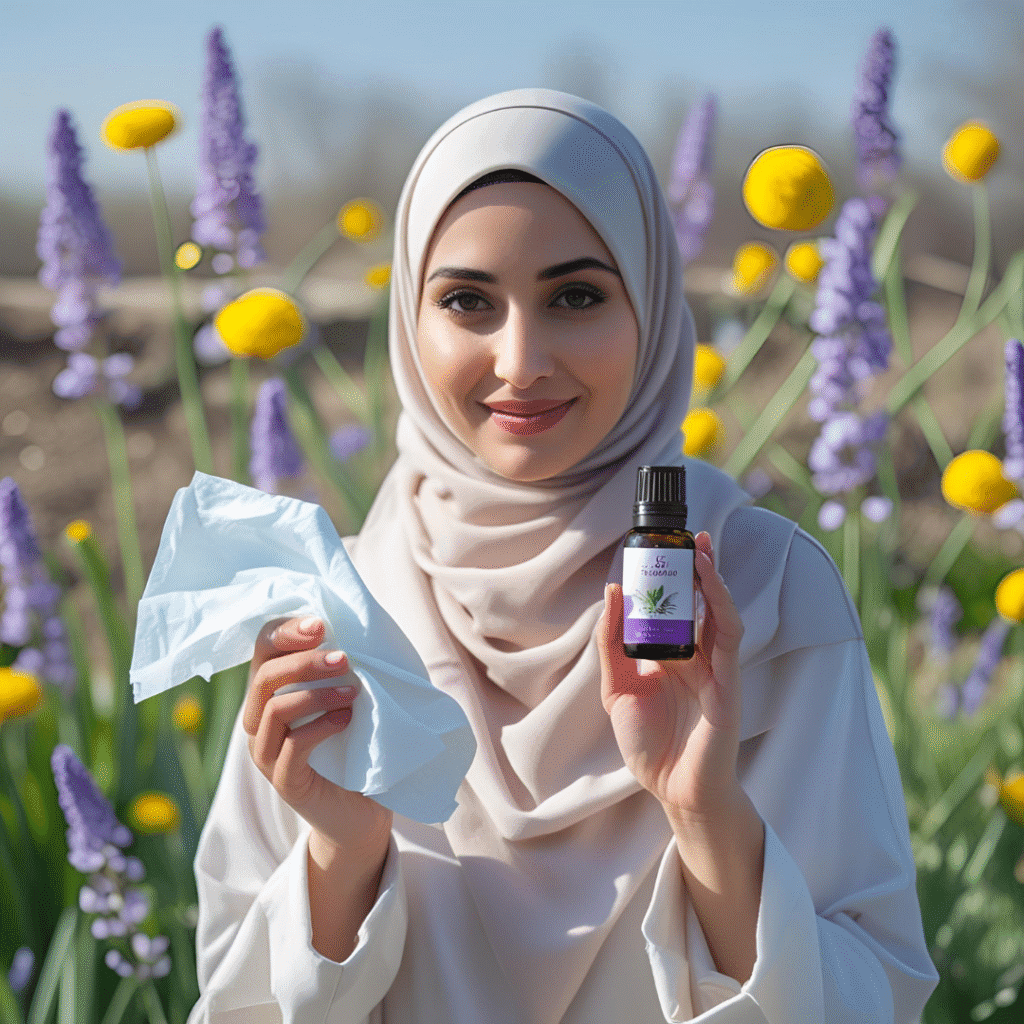
Essential Oils for Colds
Cold symptoms are usually milder than flu, but they can still make you feel pretty miserable. Essential oils have become my first line of defense when I feel a cold coming on.
Early cold intervention: At the first sign of a scratchy throat or sniffles, I start diffusing lemon and tea tree oil in my bedroom overnight.
Congestion relief: Eucalyptus and peppermint oils in a steam treatment help clear stuffy noses naturally.
Sore throat support: I gargle with salt water that has one drop of tea tree oil added (spit it out – don’t swallow!).
Sleep support: Lavender oil helps me sleep better even when I’m congested, which is crucial for recovery.
Immune support: I diffuse protective blends with lemon, eucalyptus, and tea tree oils throughout my home.
The key with colds is to start treatment early and be consistent. I’ve noticed that when I use essential oils at the first sign of symptoms, my colds are much shorter and milder.
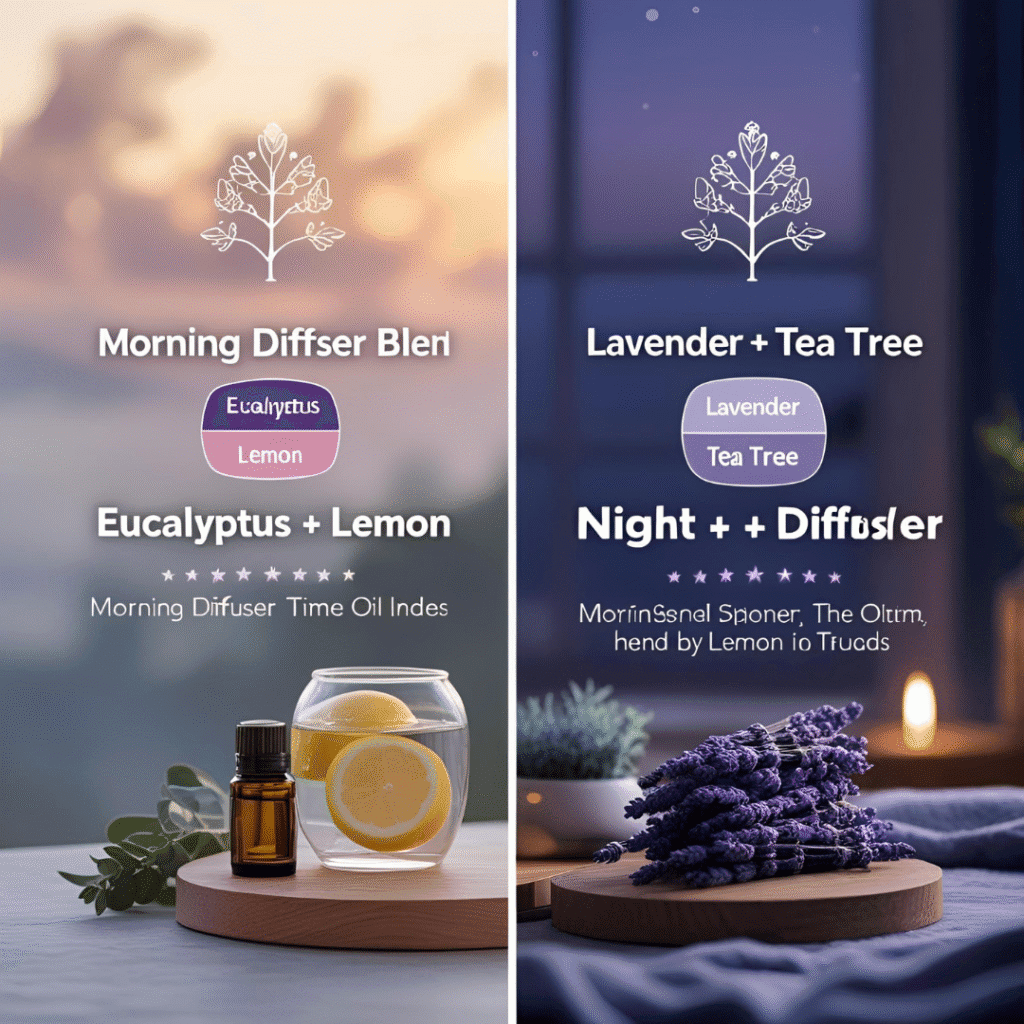
Essential Oils for Hay Fever
As someone who deals with seasonal allergies, I can tell you that essential oils have been a lifesaver during hay fever season. They provide natural antihistamine effects without the drowsiness of medications.
Peppermint oil acts as a natural antihistamine and decongestant. I keep a small bottle in my purse during allergy season for quick relief.
Lavender oil has anti-inflammatory properties that help reduce allergic reactions. I add it to my evening routine during high pollen days.
Lemon oil supports the immune system and has natural antihistamine effects. I start diffusing it in early spring before allergy season peaks.
Eucalyptus oil helps clear respiratory passages and reduces inflammation. It’s perfect for those days when pollen counts are high.
My seasonal allergy prevention routine:
- Morning: Diffuse lemon and eucalyptus oils
- Midday: Peppermint oil on a tissue for quick relief
- Evening: Lavender oil bath soak to wash off allergens and relax
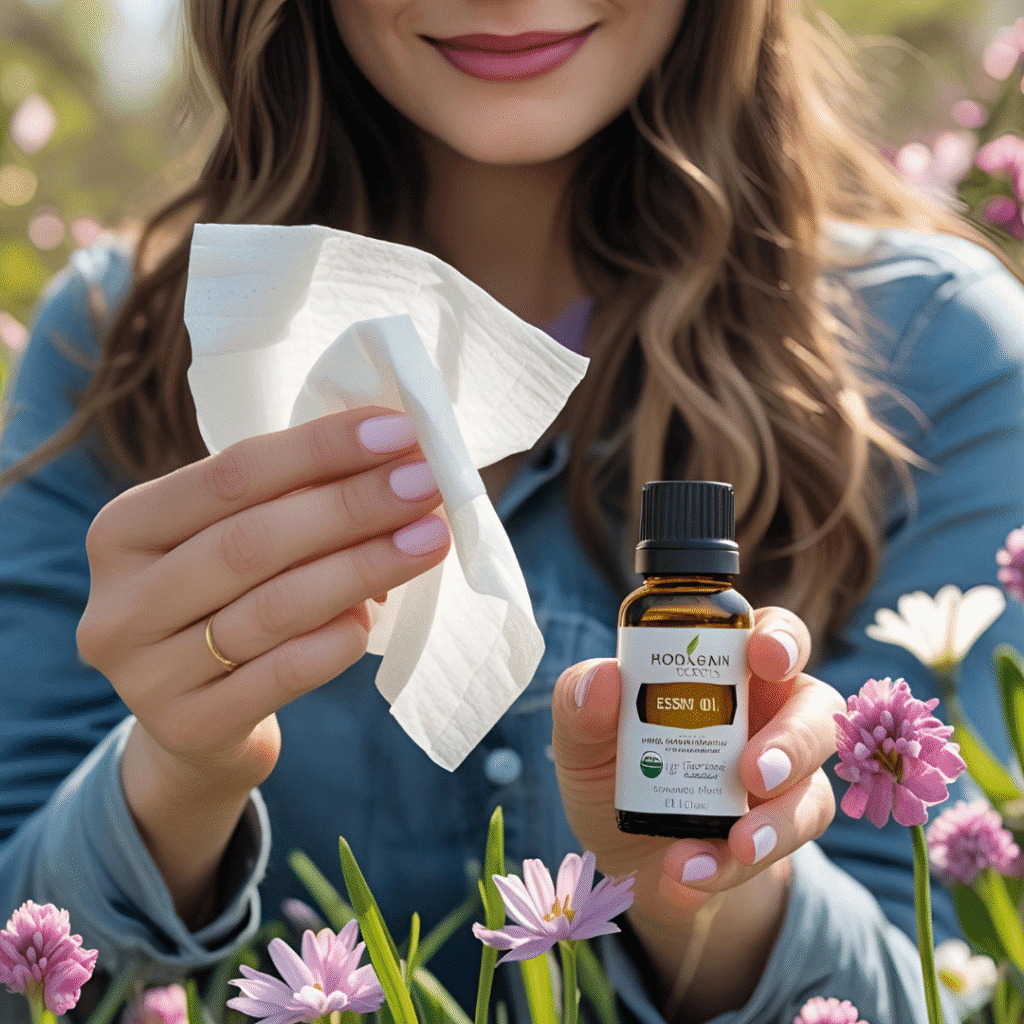
What to Know Before You Use Essential Oils
Before you dive into the wonderful world of essential oils, let me share some wisdom I wish someone had told me when I started this journey.
Quality matters more than price. I learned this the hard way after buying cheap oils that actually made my symptoms worse. Look for oils that are:
- 100% pure and natural
- Third-party tested
- From reputable companies
- Properly labeled with botanical names
Start slowly. Don’t use multiple new oils at once like I did initially. Introduce one oil at a time so you can see how your body responds.
Less is more. Essential oils are incredibly concentrated. A few drops go a long way, and using too much can actually cause headaches or skin irritation.
Storage is crucial. Keep your oils in dark glass bottles, away from heat and light. I store mine in a cool closet, and they last much longer.
Education is key. Take time to learn about each oil before using it. Some oils can interact with medications or aren’t suitable for certain health conditions.
Listen to your body. If an oil doesn’t smell good to you or makes you feel worse, stop using it. Your body knows what it needs.
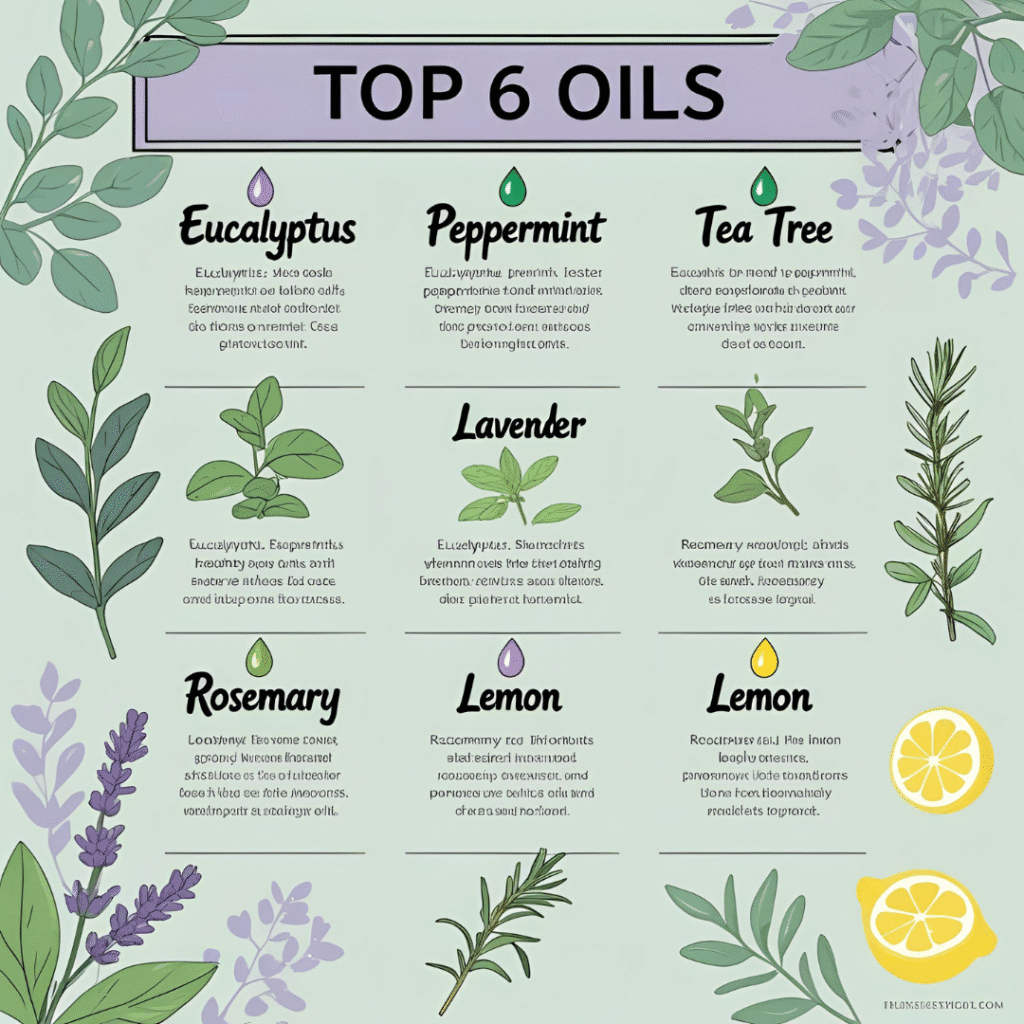
Can I Use Essential Oils for Congestion?
Absolutely! Essential oils are incredibly effective for congestion relief, and they’ve become my go-to natural remedy. The beauty of using oils for congestion is that they work in multiple ways.
Immediate relief: Oils like peppermint and eucalyptus provide almost instant decongestant effects when inhaled. I keep peppermint oil at my desk for quick relief during busy days.
Long-term support: Regular use of anti-inflammatory oils like lavender and frankincense can help reduce chronic congestion issues.
Gentle and natural: Unlike harsh nasal sprays, essential oils don’t cause rebound congestion or dependency.
Multiple application methods: Whether you prefer diffusing, steam inhalation, or topical application, there’s a method that works for your lifestyle.
The key is consistency. I find that using essential oils daily during congestion-prone seasons helps prevent problems before they start.

What Are the Best Essential Oils for Congestion?
After years of experimentation, I’ve identified the top essential oils that actually clear congestion effectively:
Eucalyptus oil is the ultimate congestion fighter. Eucalyptus Oil is very beneficial for treating sinus infection as it contains a chemical compound cineole which helps to reduce symptoms of sinusitis. Inhaling Eucalyptus Oil helps to clear the nasal passage and gives effective relief from headache, runny nose and stuffiness.
Peppermint oil contains menthol, which acts as a natural decongestant. The cooling sensation helps open airways instantly.
Tea tree oil not only clears congestion but also fights the underlying infection that might be causing it.
Rosemary oil has anti-inflammatory properties that reduce swelling in nasal passages.
Pine oil has a fresh, clearing scent that helps open respiratory passages.
Lemon oil supports immune function while providing gentle decongestant effects.
My signature congestion-clearing blend:
- 3 drops eucalyptus oil
- 2 drops peppermint oil
- 1 drop tea tree oil
I use this in my diffuser, steam treatments, and diluted chest rubs. It works every time!
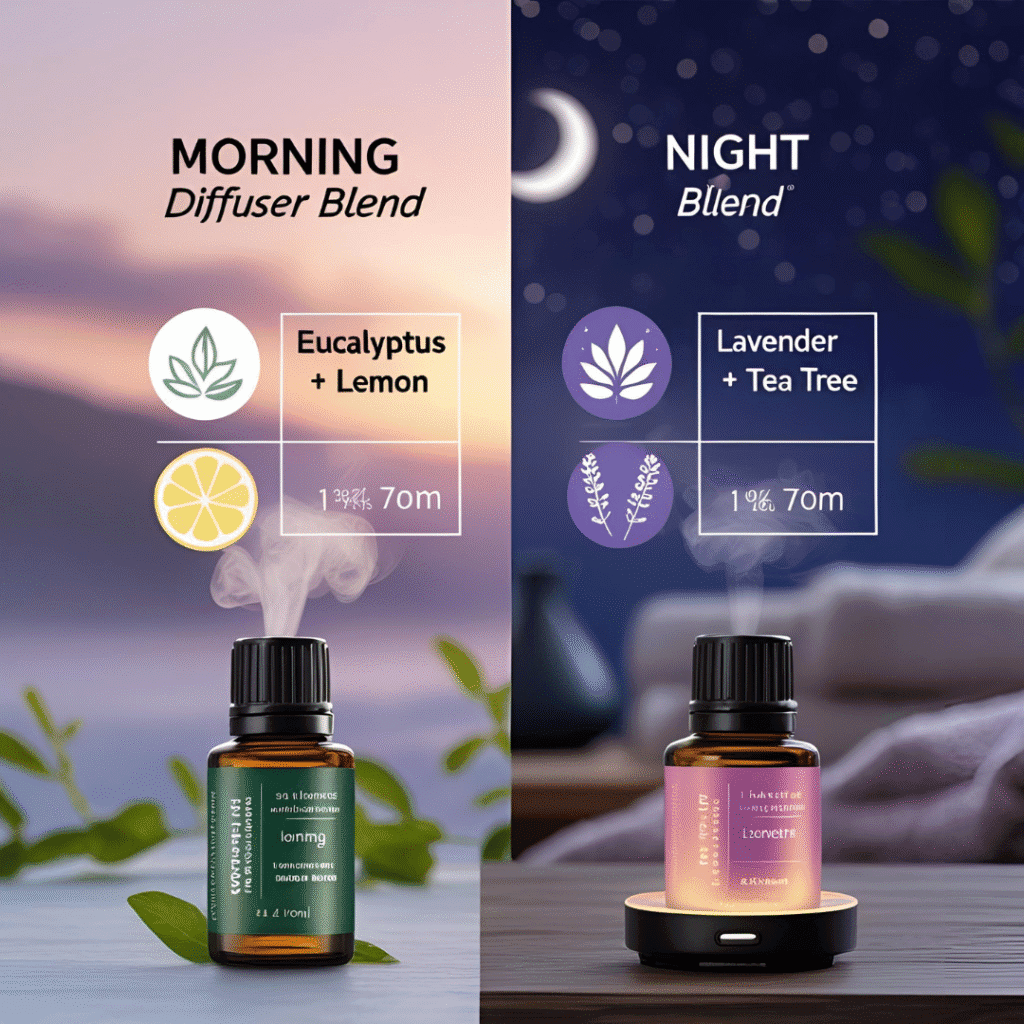
FAQs About Essential Oils for Sinus Infections
1. How long does it take for essential oils to work for sinus infections?
From my experience, you can feel some relief within minutes when using steam inhalation or direct inhalation methods. For deeper healing and infection fighting, consistent use over 3-5 days usually shows significant improvement. I always start feeling better after my first eucalyptus steam treatment!
2. Can I use essential oils if I’m pregnant?
This is super important – always consult your healthcare provider first! Some oils like peppermint and eucalyptus are generally considered safe in small amounts during pregnancy, but others like oregano and rosemary should be avoided. I always recommend checking with your doctor before using any essential oils during pregnancy or nursing.
3. Are essential oils safe for children with sinus issues?
Children under 6 shouldn’t use most essential oils directly. For older children, always dilute oils more than you would for adults (1 drop per tablespoon of carrier oil), and avoid strong oils like peppermint near their face. Lavender is usually the safest option for kids, but check with their pediatrician first.
4. Can I use essential oils with my medication?
Essential oils can be used alongside most medications, but some oils might interact with certain drugs. If you’re taking blood thinners, have high blood pressure, or take other medications regularly, check with your pharmacist or doctor before starting essential oils.
5. What’s the difference between therapeutic grade and regular essential oils?
“Therapeutic grade” isn’t actually a regulated term, so don’t get fooled by marketing! What matters is purity, sourcing, and third-party testing. Look for oils that are 100% pure, organically sourced when possible, and tested for quality. I’ve found that investing in quality oils makes a huge difference in effectiveness.
6. Can essential oils cure sinus infections completely?
Essential oils are amazing for symptom relief and supporting your body’s natural healing, but they might not cure severe bacterial sinus infections that need antibiotics. I use them as my first line of defense and for ongoing support, but if symptoms worsen or last more than 10 days, I see my doctor.
7. How often can I use essential oils for sinus relief?
I use my diffuser daily during sinus season, do steam treatments 1-2 times per day when symptomatic, and apply diluted topical blends 2-3 times daily. The key is listening to your body – if you start getting headaches or skin irritation, you’re using too much too often.
8. Why do some essential oils make my sinus symptoms worse?
This usually happens with synthetic or low-quality oils that contain added fragrances or chemicals. Some people are also sensitive to certain natural compounds. If an oil makes you feel worse, stop using it immediately. Also, using undiluted oils or too much oil can cause irritation that worsens symptoms.
9. Can I make my own sinus relief blends at home?
Absolutely! Making your own blends is fun and cost-effective. Start with simple combinations like eucalyptus + peppermint, or lavender + tea tree. Keep notes on what works for you. My go-to recipe is 3 drops eucalyptus, 2 drops peppermint, and 1 drop tea tree oil – it works every time!
Conclusion
Ladies, I hope this guide has opened your eyes to the amazing world of essential oils for sinus health! From my personal journey dealing with chronic sinus issues to discovering these natural remedies, essential oils have truly transformed how I approach wellness.
Remember, the key to success with essential oils is consistency, quality, and patience. Start with one or two oils that appeal to you – I recommend eucalyptus and lavender for beginners – and gradually build your collection as you discover what works best for your body.
What I love most about this natural approach is how it fits perfectly into our self-care routines. Whether you’re doing a relaxing steam treatment as part of your evening skincare ritual or diffusing energizing oils during your morning routine, essential oils enhance both your health and your daily beauty practices.
The science supports what many of us have experienced firsthand – essential oils can provide real relief from sinus congestion, support immune function, and help us feel more comfortable during those inevitable seasonal challenges.
Don’t forget to always prioritize safety by diluting oils properly, doing patch tests, and consulting healthcare providers when needed. Your health is your most beautiful accessory, and taking care of it naturally with essential oils is an investment in feeling and looking your absolute best.
I’d love to hear about your experiences with essential oils for sinus relief! Share your favorite blends and success stories – we’re all in this wellness journey together.
Stay healthy, stay beautiful, and remember that natural doesn’t mean less effective. Sometimes the best solutions come straight from nature’s pharmacy.
For more natural wellness tips and beauty advice, check out our other health and beauty articles on StyleUpLadies.com. Don’t forget to follow us for the latest trends in natural beauty and wellness!
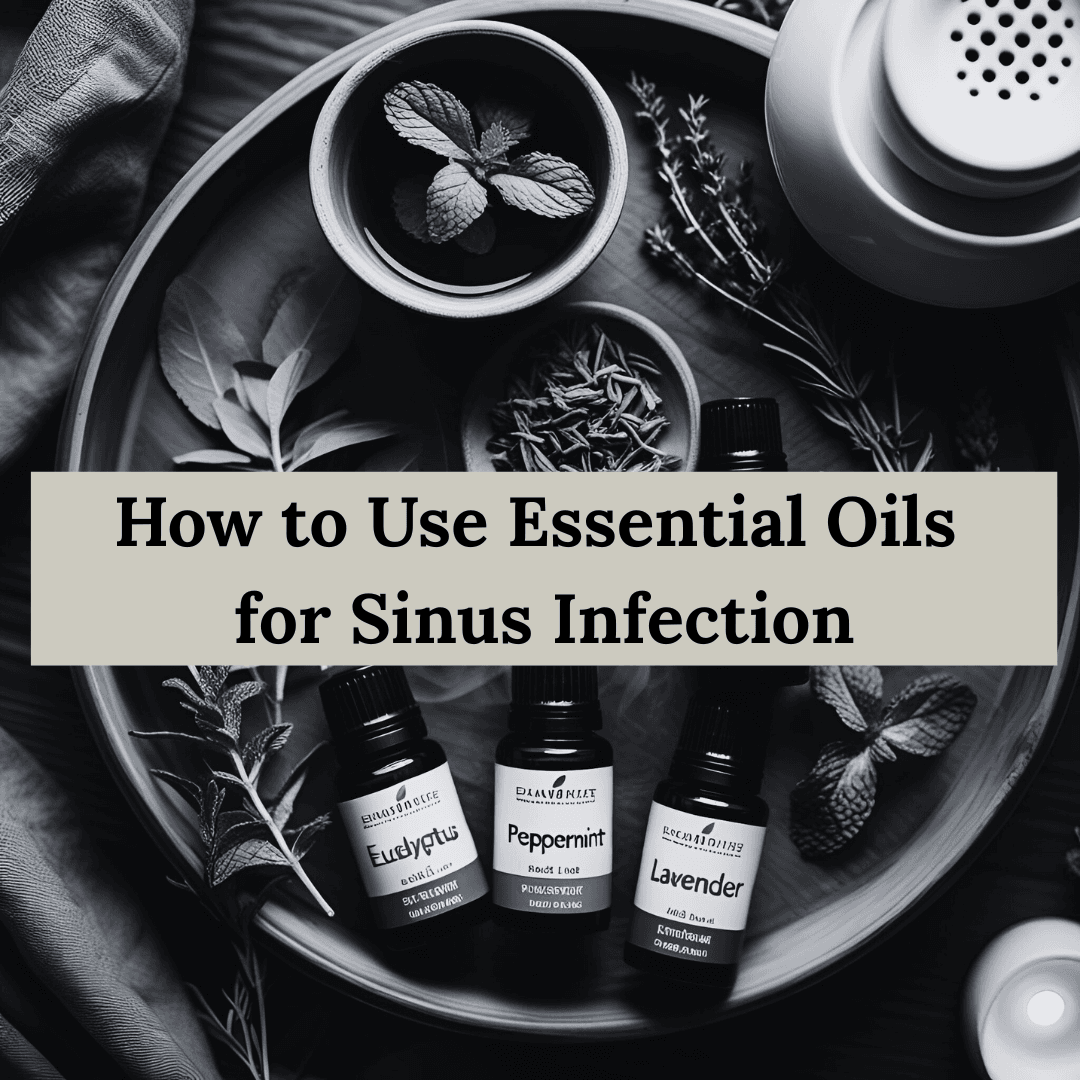







Leave a Reply